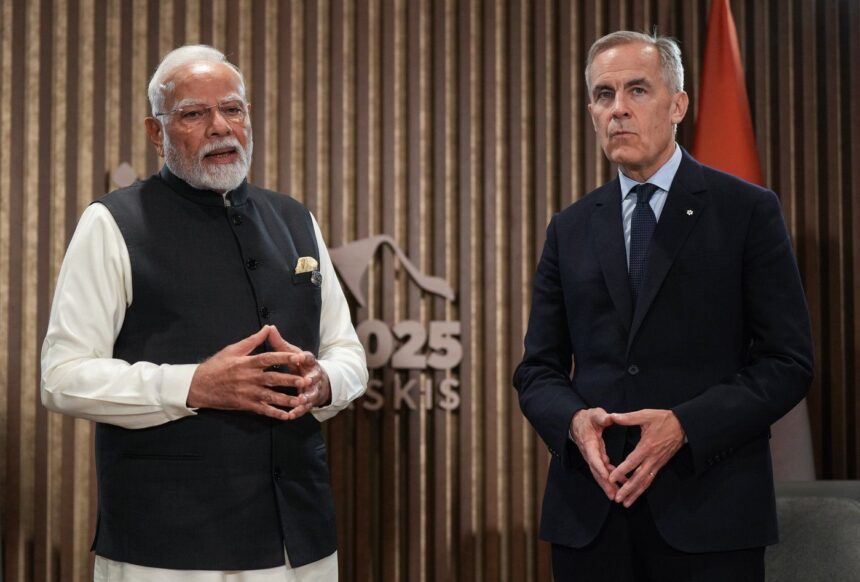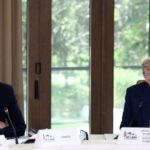In a decisive break from months of diplomatic frost, Prime Minister Mark Carney has firmly defended his administration’s move to restore full diplomatic relations with India, characterizing the renewed engagement as “foundational” to Canada’s strategic interests in the Indo-Pacific region.
Speaking at a press conference in Ottawa yesterday, Carney addressed the controversial decision that has sparked heated debate across Canada’s political landscape. “Diplomatic isolation achieves nothing but mutual disadvantage,” Carney stated, flanked by Foreign Affairs Minister Anita Anand. “Our renewed approach with India represents a pragmatic recognition that engagement, even during periods of profound disagreement, serves our national interests better than continued estrangement.”
The diplomatic thaw comes after nearly two years of severely strained relations following allegations of Indian government involvement in the 2023 killing of Sikh separatist Hardeep Singh Nijjar on Canadian soil. Those accusations, which India consistently denied, led to the mutual expulsion of diplomats and a near-complete breakdown in bilateral communications.
“We have not abandoned our principles or our commitment to justice,” Carney emphasized, addressing concerns from critics who claim the government has prioritized economic interests over accountability. “The investigation into Mr. Nijjar’s death continues with full vigor and resources. But Canada cannot afford diplomatic isolation from the world’s most populous country and fifth-largest economy during these uncertain global times.”
Economic data suggests the diplomatic rift has cost both nations significantly. Canadian business leaders have reported losing approximately $4.7 billion in potential trade and investment opportunities since 2023, while education institutions have seen a 37% decline in international students from India, previously their largest source country.
Foreign Affairs Minister Anand outlined the specific steps being taken to normalize relations, including the return of ambassadors to respective posts by August, resumption of visa processing at pre-2023 levels, and the establishment of a new bilateral security dialogue focused on addressing mutual concerns about extremism.
“We’re entering this renewed relationship with clear eyes,” Anand stated. “Differences remain, and will be addressed through principled diplomacy rather than public confrontation.”
The opposition has criticized the timing of the announcement, with Conservative leader Pierre Poilievre questioning whether the government received concrete commitments from India regarding cooperation in the Nijjar investigation. “Has Prime Minister Carney secured actual guarantees of Indian cooperation, or has he simply surrendered on justice to chase trade dollars?” Poilievre asked during Question Period.
Meanwhile, NDP leader Jagmeet Singh expressed “profound disappointment” with the decision, arguing it sends a dangerous message about Canada’s commitment to protecting its citizens. “The government appears willing to normalize relations without accountability for an alleged assassination on Canadian soil,” Singh said at a press conference in Vancouver.
The India-Canada relationship has broader implications for global politics and regional stability. Defense analysts point to India’s crucial role in counterbalancing Chinese influence in the Indo-Pacific, a strategic priority identified in Canada’s most recent foreign policy framework.
Dr. Stephanie Reynolds, Director of South Asian Studies at the University of Toronto, sees the move as inevitable but delicate. “The Trudeau government’s approach created an unsustainable diplomatic situation that needed correction. Carney is attempting that correction while trying not to appear as though Canada is backing down on serious allegations,” Reynolds told CO24 in an interview.
For Canada’s 1.4 million-strong Indo-Canadian community, the diplomatic reset evokes mixed reactions. Community leaders report division between those who prioritize strengthening bilateral ties and others who demand full accountability for the Nijjar case before normalization.
As both nations navigate this tentative diplomatic restart, questions remain about how the relationship will evolve alongside an ongoing murder investigation with international implications. Has Canada found the right balance between pragmatic engagement and principled advocacy, or does this diplomatic reset signal a troubling precedent for how nations respond when core values and strategic interests collide?
























